Grow Your Own Seasoning Blends
I’ve really enjoyed making and using my own seasoning blends over the years. It is particularly rewarding when I successfully grow and add my own homegrown herbs and seeds to the seasoning mix. They taste so much better than the store bought versions – and I know exactly what’s in them.
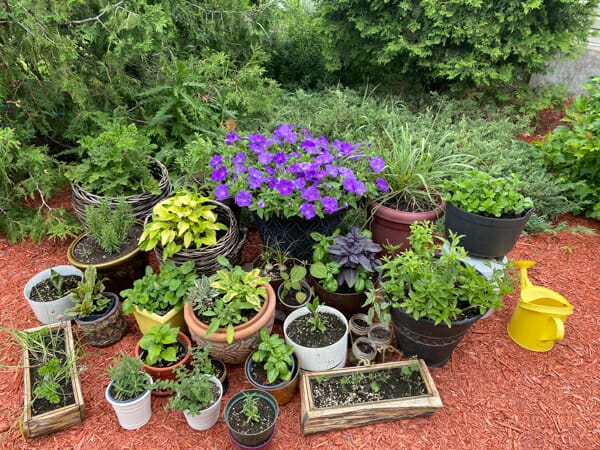
Read more: Homemade Seasoning Blends, Grow your own Herbal Teas, Herb Growing Chart for the Prairies.
Late winter or early spring is the best time to plan your herb garden. Strategically, think about what herbs and seeds you need so you’ll have the ingredients for your favorite seasoning blends.
In addition to their culinary gifts, herbs are also an attractive addition to flower and vegetable gardens, whether it’s their blossoms, like these chives or their beautifully textured or colored foliage like this variegated sage (shown early spring).
Plan your Herb Garden with Seasoning Blends in Mind
To plan out your herb garden, start by thinking of your favorite seasoning blends:
German Seasoning – as I’ve dubbed the trio of dill, parsley, chives
Italian Seasoning – basil, marjoram, parsley, oregano, garlic, onion, thyme, sage
Lemon Herb Seasoning – basil, oregano, parsley, onion, celery seed, thyme, garlic, lemon
Mexican Seasoning – chili powder, cumin, coriander, oregano, garlic, paprika, onion, cayenne
Rosemary Finishing Salt – rosemary, salt
Steak Seasoning– coriander seed, paprika, onion, garlic, cayenne, thyme, mustard
Cajun Seasoning – paprika, garlic, onion, cayenne, oregano, thyme
Garam Masala – cardamom, cumin, coriander, cinnamon, cloves, nutmeg, turmeric
Like me, you may not be able to grow everything on the list! (One year in my excitement I actually googled how black pepper is grown. There’s no way I would have the patience for growing a tropical vine that is super sensitive)! I have learned to stick with plants that can be grown outside in our prairie climate without too much fuss. Here’s are the herbs I grow & a few tips for getting your seeds started.
Growing Tips for Common Seasoning Herbs
Chives
Seed outdoors, super easy to grow, will reseed and return year after year, but easy to manage.
Dill
Seed outdoors, will reseed and return year after year, but easy to manage.
Coriander/cilantro
Seed outdoors, harvest greens as cilantro then coriander after it bolts and goes to seed (tricky to grow because it bolts so quickly, requires constant re-seeding to get fresh tender cilantro).
Parsley
Start from seedling, easy once established.
Thyme
Start from seedling, super easy once established, will overwinter if well insulated in winter.
Sage
Start from seedling, may overwinter if well insulated in winter.
Oregano
Start from seedling, may overwinter and come back next year, fast and easy to grow.
Basil
Start from seeds indoors – very sensitive to cold/frost, loves the sun, requires regular watering.
Rosemary
Start from a seedling – very sensitive to cold/frost, will not overwinter unless brought indoors under grow lights.
Onion
Plant onion sets early in spring.
Garlic
Plant individual cloves very early in spring (ideally in the previous fall).
Cayenne pepper
Start peppers from seeds indoors.
Grow Herbs for Herbal Tea too!
Add these culinary seasoning herbs to your favorite tea herbs and you’re ready to head to the garden or greenhouse.
More Growing Tips for Culinary Herbs
- If you don’t have garden space, consider planting herbs in containers.
- Dill and cilantro are fast growing and can look a bit spindly as stand alone plants. They also go to seed fairly quickly, so harvest repeatedly and even consider staggering the seeding throughout the season.
- Herbs don’t like wet feet – ensure good drainage (add a layer of sand or gravel when planting transplants) and don’t over water.
- Most herbs enjoy plenty of sunlight. Some like chives, parsley, mint, coriander/cilantro, oregano, tarragon and thyme will tolerate dappled shade.
- Herbs make beautiful companion plants in flower gardens, often helping keep critters away.
- Cut back and use your herbs throughout the season, they’ll grow stronger and produce more. Here, basil is being trimmed back before it even makes it out of the greenhouse. Trimming the top leaves will make the basil branch out and produce more.
- You can start herbs from seeds, but it requires a little more attention and gardening know-how. If you’re new to gardening or just don’t have a lot of patience, buy small seedlings – you’ll be surprised how quickly they’ll grow.
- You don’t need a lot of plants – one or two of each will serve you well throughout the summer. But if you want to dry herbs for seasoning blends, consider getting a couple extra.
- Talk to your local greenhouse staff about different varieties and their culinary properties.
- Some herbs retain better flavor when frozen instead of dried. While I use both, I find frozen dill, parsley and chives retain more flavor longer than their dried counterparts. I dry some for the seasoning blends and freeze the rest.
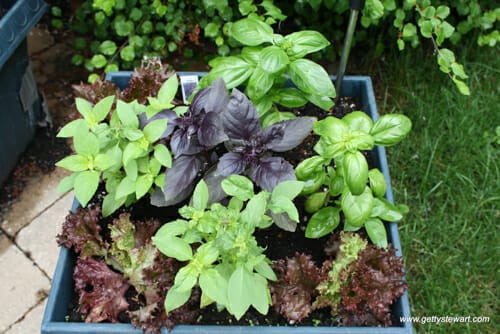
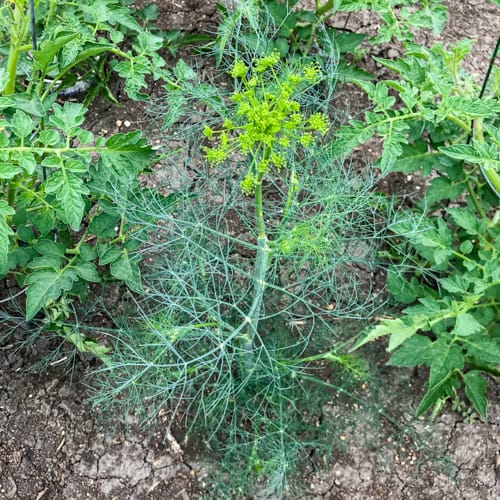
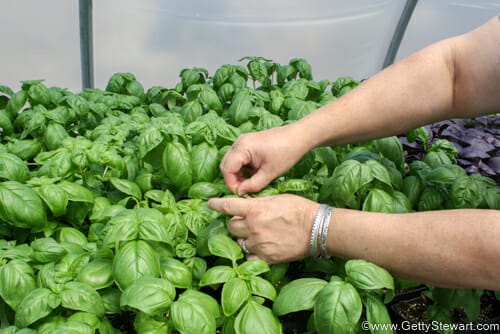
More Gardening How To Help
- How to Plant Beets
- How to Plant Corn
- How to Plant Carrots
- How to Plant Peas
- How to Plant Garlic
- Top 5 Herbs for Your Garden
- Grow Your Own Herbal Teas
- When to Plant Different Vegetables
Select, store and serve seasonal food for everyday cooking with Getty. Getty is a food educator and Professional Home Economist, who loves sharing tips and recipes following the seasons from her Canadian kitchen. Sign up to get seasonal tips and recipes delivered to your inbox. Learn more about Getty or check out her books and pdf guides.



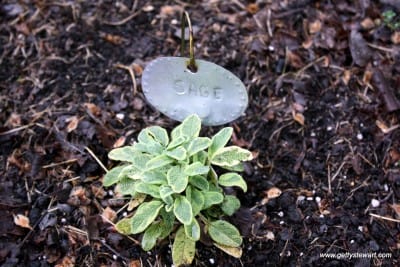

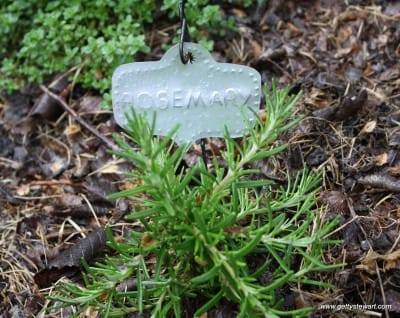
Hi,
I have a rosemary bush which was planted near the wall of the house about 15yrs ago here in scotland, each year it is covered in snow, and worse for rosemary, damp and cold, yet it has grown to 4ft and has often bloomed continuously right through summer and winter yet I could never grow basil which is so tender and cannot take the occassional below 15c summer night and frequent damp.
I think its worth trying all the herbs in different lications in your garden as the micro climates in different situations are unpredictable
Hi TJ,
Thanks for sharing your herb experience and excellent advice. I’d love to see your rosemary bush it sounds fantastic!